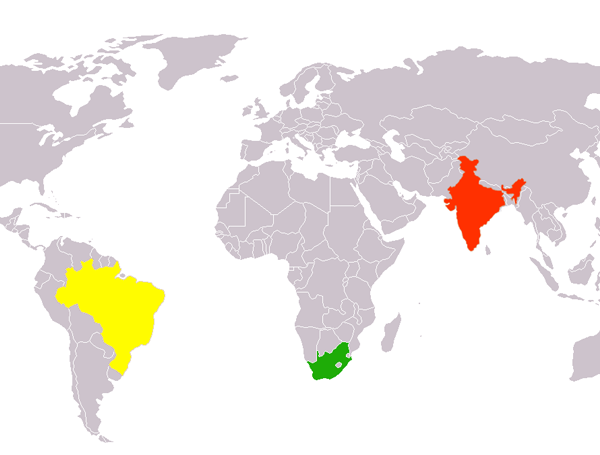International Relations
IBSA Forum
- 16 Aug 2021
- 7 min read
Why in News
Recently, India organized the IBSA (India, Brazil and South Africa) Tourism Ministers’ virtual meeting.
- India is the current IBSA Chair.
Key Points
- About:
- The IBSA is a trilateral, developmental initiative between India, Brazil and South Africa to promote South-South cooperation and exchange.
- The idea of South-South Cooperation (SSC) is not new. Its genesis can be traced back to the decades of efforts by countries and groupings working together to ensure South-South solidarity such as Bandung conference 1955, Non-Aligned Movement 1961, G77 grouping, UNCTAD, the Buenos Aires Plan of Action 1978, and the 2009 Nairobi declaration.
- Formation:
- The grouping was formalized and named the IBSA Dialogue Forum when the Foreign Ministers of the three countries met in Brasilia (Brazil) on 6th June 2003 and issued the Brasilia Declaration.
- Headquarters:
- IBSA does not have a headquarters or a permanent executive secretariat.
- At the highest level, it counts on the Summits of Heads of State and Government.
- So far Five IBSA Leadership Summits have been held. The 5th IBSA Summit was held in Pretoria (South Africa) in 2011. The 6th IBSA Summit is to be hosted by India.
- Joint Naval Exercise:
- IBSAMAR (IBSA Maritime Exercise) is an important part of IBSA trilateral defence cooperation.
- Six editions of IBSAMAR have been held so far, the latest one being off the coast of South Africa in October, 2018.
- IBSA Fund:
- Established in 2004, IBSA Fund (India, Brazil and South Africa Facility for Poverty and Hunger Alleviation) is a unique Fund through which development projects are executed with IBSA funding in fellow developing countries.
- The fund is managed by the United Nations (UN) Office for South-South Cooperation (UNOSSC). Each IBSA member country is required to contribute $1 million per annum to the fund.
- Objectives:
- To alleviate poverty and hunger in nations of the South;
- To develop best practices in the fight against poverty and hunger by facilitating the execution of replicable and scalable projects in interested countries of the global south;
- To pioneer and lead by example the South-South cooperation agenda;
- To build new partnerships for development.
- IBSA Fellowship Programme:
- It focuses on multilateral institutional frameworks to coordinate, support and enable sustainable development globally; joint research for cooperation and exchange of information in the fields of macro-economy, trade and development; and any other area as may be found of interest within the IBSA framework.
- Performance So Far:
- Relevance in the wake of the emergence of BRICS:
- The grouping faces a fundamental challenge to maintain its relevance in the wake of the emergence of similar groupings such as BRICS (Brazil, Russia, India, China and South Africa).
- IBSA has been unable, until now, to hold its sixth summit.
- Execution of Human Development Projects:
- Over the years, the fund has contributed $39 million and partnered in 19 countries from global South to implement 26 projects.
- Projects have been funded in countries such as Guinea Bissau, Sierra Leone, Cape Verde, Burundi, Cambodia, Haiti, Palestine, Vietnam and others.
- The fund has also been recognised for its good work in the field and has received UN South-South Partnership award 2006, UN MDG (Millenium Development Goals) award 2010, and the South-South and Triangular Cooperation Champions award in 2012.
- Relevance in the wake of the emergence of BRICS:
- Opportunities:
- In the Emergence of BRICS:
- Working collectively towards ensuring the MERCOSUR -SACU-India Trilateral PTA (Preferential trade Agreement) first, and eventually a Free Trade Area (FTA), will go a long way in ensuring the grouping's relevance. (MERCOSUR for Brazil & SACU for South Africa).
- The Southern Common Market (MERCOSUR for its Spanish initials) is a regional integration process, initially established by Argentina, Brazil, Paraguay, and Uruguay, and subsequently joined by Venezuela and Bolivia.
- The Southern African Customs Union (SACU) consists of Botswana, Lesotho, Namibia, South Africa, and Swaziland. The SACU Secretariat is located in Namibia. SACU was established in 1910, making it the world’s oldest Customs Union.
- The grouping must work together as a joint lobby in other groupings of which they are members of, such as BRICS and G20.
- Working collectively towards ensuring the MERCOSUR -SACU-India Trilateral PTA (Preferential trade Agreement) first, and eventually a Free Trade Area (FTA), will go a long way in ensuring the grouping's relevance. (MERCOSUR for Brazil & SACU for South Africa).
- Reforming Multilateral Institutions:
- Reforming institutions such as the United Nations Security Council (UNSC), IMF etc. is a necessary prerequisite to forge consensus behind the principle of economic development among developing countries.
- India, Brazil and South Africa have serious aspirations to become permanent members of UNSC.
- Reforming institutions such as the United Nations Security Council (UNSC), IMF etc. is a necessary prerequisite to forge consensus behind the principle of economic development among developing countries.
- In the Emergence of BRICS:
Way Forward
- The forum continues to be a motor for global institutional reforms in the future, striving collectively to establish a rules-based and transparent international trading and finance system.
- By offering a new partnership based model for development cooperation, the forum has taken a giant step towards accelerating the development agenda of the global South.
- The ‘people centric’ approach is what defines and sets South-South cooperation apart from other partnership models. This particular focus on people-centric social policies is what will help in accelerating the restructuring of international financial architecture and reforming institutions of global governance.





